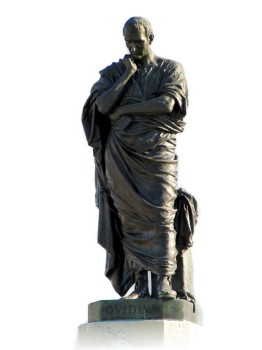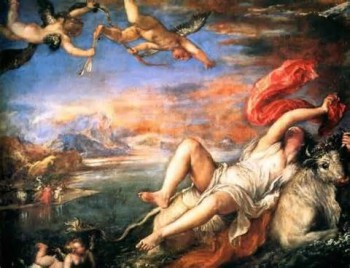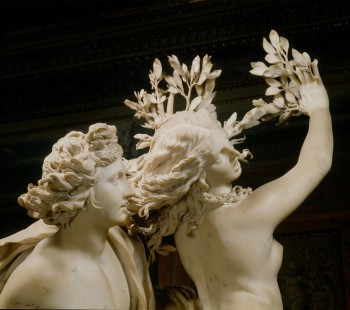Ancient Worlds: An Unlikely Epic
 We’re kicking off the year (wrapping it up, technically, but since this is an introduction, we’ll elide the difference) with a return to form. I’m also giving myself a holiday present, because this? This is a work by one of my favorite authors of all time.
We’re kicking off the year (wrapping it up, technically, but since this is an introduction, we’ll elide the difference) with a return to form. I’m also giving myself a holiday present, because this? This is a work by one of my favorite authors of all time.
And when a Classicist says that, it really means something.
Ovid’s Metamorphoses were written under the reign of the Emperor Augustus. If we didn’t have solid dating on Ovidius Naso’s life (he was born on March 20, 43 BC and died sometime in 17/17 CE) we’d have this detail, because he and the first emperor of the Romans did not get on. Ovid ended his life in exile, in part because of his poetry (including the Metamorphoses) and in part because of…something. That something is one of the most tantalizing mysteries of the Augustan era. We know that Ovid did something that offended Augustus so deeply that he was sent to the very end of the empire and left there to rot. He writes in the Tristia (his book of poems written from that exile) that he was sent away for “carmen et error”: a “poem and a mistake”, but never reveals more.
Did he have an affair with Augustus’s daughter Julia, who was exiled for promiscuity? Did he have a part in a revolutionary plot, a role that was too vague for execution but too solid to be ignored? Did he make one joke too many? We don’t know, and it keeps me up at night. In all seriousness, if I ever wake up in the dead of night to hear that telltale whoosh-rattle-whoosh and a blue phone box appears in my garden, you will see me running outside in my nightie waving a copy of the Oxford Classical Dictionary and screaming “TAKE ME TO OVID!”
It would be for history, on my honor as a matron.
But while we do not have the salacious details, we do have a handful of surviving works. Ovid is remarkably well-preserved: what we have is

complete (although what we don’t have, including a lost Medea, is heartbreaking) and well attested throughout its literary lifetime. Ovid wrote, among other works, the Amores, a series of elegiac love poems that everyone should read once, the Ars Amatoria or Art of Love, a humorous and instructive guide to getting a lover and what to do with one once you get one, the aforementioned Tristia, and, most famously of all, The Metamorphoses.
The Metamorphoses is considered an epic poem, which is to say that it is written in verse and in dactylic hexameter. It is thus in the same genre, in ancient terms, as Homer’s works and the Aeneid. But once you get beyond the formal category, the Metamorphoses are something very different indeed. The work is not one long, continuous narrative, although it is an amazing feat of unbroken storytelling. Rather it is a multi-book interlaced retelling of hundreds of stories, all interwoven into a single chain that unites it from beginning to end.
And what are those stories? If you’ve heard a story of Greek or Roman myth, it is probably here. The best-known stories, the ones you probably learned in middle school, are found here. The ones people used to know very well and you probably would recognize from Shakespeare? Found here.
Pyramus and Thisbe. Procne and Philomela. Venus and Adonis.
The myth of Orpheus. The story of Arachne. Theseus and the Minotaur. If it happened from between the time that Void gave rise to Ouranos and Gaia and the death of Julius Caesar, it likely gets a nod from Ovid.
It’s not that this is the only source we have for these myths: most of them exist elsewhere. It’s that this collection was so prominent for so long that it kept many of these myths alive and in consciousness even as so much of the ancient world was lost.
The Metamorphoses, with its theme of changing bodies and changing forms, would go on to influence art and literature even up to the present day. Bocaccio, Chaucer, Dante, Shakespeare, Marlowe. C. S. Lewis. Tolkien. Gaiman. When we talk about the cornerstones of Western Literature, Ovid is on an even plumb with Homer and the Bible.
Given the nature of this beast, we won’t go through sequentially. We won’t even hit every major story Ovid covers. But we will touch on the heavy hitters. First up: Apollo, Daphne. #NotAllGods.
Any requests while I’m at it?

Iphis and Ianthe.
The first time I read a list of possibilities for the mysterious error that got him exiled, I wanted to see it as a play in which ALL of them happened. Ovid runs down a corridor full of doors, trying to escape his chagrin at the last thing he saw that he wasn’t supposed to see (The Emperor’s mother naked! Eek! Slam! An initiates-only ritual to Cybele! Eek! Slam!)
When I told my grad school friends of my nutty vision, one of them perfected it by adding, “And it should be a puppet show. With button-eyed sock puppets.”
Ovid would be my first stop, unless the inhabitant of that blue box would allow me to intervene in the burning of the Library of Alexandria.